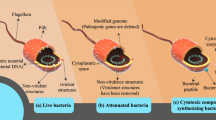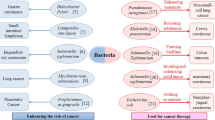Abstract
Cancer is one of the most dreaded diseases in humans and most common cause of death in twenty-first century. New cancer therapies are urgently required because of the existing pharmacological side effects of the conventional chemotherapy, radiation, or surgery. Newer modalities such as cancer vaccines and biological therapies are proving very helpful in the treatment of cancer along with the conventional therapies. The success of these novel cancer therapies is attributed to their lesser toxicity and the specific killing of the cancer cells. Bacterial therapy for cancer has been recognized a century ago. Live, attenuated, or genetically modified obligate or facultative anaerobic bacterial species exhibit the inherent property of colonizing the tumors and are capable of multiplying selectively inside the tumors, thereby inhibiting cancerous growths. The bacteria and their spores are used in the target specific therapies, delivering the prodrugs and the various proteins to the tumors. Albeit bacterial treatment of cancer is providing new perspective in the treatment of disease, the use of microorganisms to target tumors has certain confinements. The biosafety, genetic instability and the confounded interaction of the bacteria with treatment drugs, requires the more noteworthy consideration regarding the use of this novel treatment in the cancer treatment.
Access this chapter
Tax calculation will be finalised at checkout
Purchases are for personal use only
Similar content being viewed by others
References
Forbes NS (2010) Engineering the perfect (bacterial) cancer therapy. Nat Rev Cancer 10:785–794
Frahm M, Felgner S, Kocijancic D et al (2015) Efficiency of conditionally attenuated Salmonella enterica serovar Typhimurium in bacterium-mediated tumor therapy. mBio 6(2): e00254-15
Frankel AE, Rossi P, Kuzel TM et al (2001) Diphtheria fusion protein therapy of chemoresistant malignancies. Curr Cancer Drug Targets 2:19–36
Hanahan D, Weinberg RA (2011) Hallmarks of cancer: the next generation. Cell 144:646–674
Lehouritis P, Springer C, Tangney M (2013) Bacterial-directed enzyme prodrug therapy. J Control Release 170:120–131
Liu S, Xu X, Zeng X et al (2014) Tumor-targeting bacterial therapy: a potential treatment for oral cancer. Oncol Lett 8:2359–2366
Nelson MH, Diven MA, Huff LW et al (2015) Harnessing the microbiome to enhance cancer immunotherapy. J Immunol Res. doi:10.1155/2015/368736
Patyar S, Joshi R, Byrav DS et al (2010) Bacteria in cancer therapy: a novel experimental strategy. J Biomed Sci 17:21–29
Roberts NJ, Zhang L, Janku F et al (2014) Intratumoral injection of Clostridium novyi-NT spores induces antitumor responses. SciTransl Med. doi:10.1126/scitranslmed.3008982
Rosadi F, Fiorentini C, Fabbri A (2016) Bacterial protein toxins in human cancers. Pathog Dis. doi:10.1093/femspd/ftv105
Ruan Z, Yang Z, Wang Y (2009) DNA vaccine against tumor endothelial marker 8 inhibits tumor angiogenesis and growth. J Immunother 32:486–491
Wood LM, Guirnalda PD, Seavey MM et al (2008) Cancer immunotherapy using Listeria monocytogenes and listerial virulence factors. Immunol Res 42:233–245
Yoo JW, Irvine DJ, Discher DE et al (2011) Bio-inspired, bioengineered and biomimetic drug delivery carriers. Nat Rev Drug Discov 10:521–535
Zhang J, Kale V, Chen M (2015) Gene-directed enzyme prodrug therapy. AAPS J 17:102–110
Author information
Authors and Affiliations
Corresponding author
Editor information
Editors and Affiliations
Rights and permissions
Copyright information
© 2016 Springer International Publishing Switzerland
About this chapter
Cite this chapter
Sarotra, P., Medhi, B. (2016). Use of Bacteria in Cancer Therapy. In: Walther, W. (eds) Current Strategies in Cancer Gene Therapy. Recent Results in Cancer Research, vol 209. Springer, Cham. https://doi.org/10.1007/978-3-319-42934-2_8
Download citation
DOI: https://doi.org/10.1007/978-3-319-42934-2_8
Published:
Publisher Name: Springer, Cham
Print ISBN: 978-3-319-42932-8
Online ISBN: 978-3-319-42934-2
eBook Packages: MedicineMedicine (R0)




